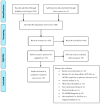The Role of Omega-3 Fatty Acids in Developmental Psychopathology: A Systematic Review on Early Psychosis, Autism, and ADHD
- PMID: 29207548
- PMCID: PMC5751211
- DOI: 10.3390/ijms18122608
The Role of Omega-3 Fatty Acids in Developmental Psychopathology: A Systematic Review on Early Psychosis, Autism, and ADHD
Abstract
In this systematic review, we will consider and debate studies that have explored the effects of ω-3 polyunsaturated fatty acids (PUFAs) in three major, and somehow related, developmental psychiatric disorders: Autism, Attention Deficit and Hyperactivity disorder and Psychosis. The impact of ω-3 PUFAs on clinical symptoms and, if possible, brain trajectory in children and adolescents suffering from these illnesses will be reviewed and discussed, considering the biological plausibility of the effects of omega-3 fatty acids, together with their potential perspectives in the field. Heterogeneity in study designs will be discussed in the light of differences in results and interpretation of studies carried out so far.
Keywords: PUFAs; attention deficit hyperactivity disorder (ADHD); autism; docosahexaenoic acid (DHA); eicosapentaenoic acid (EPA); first psychotic episode; neurodevelopment; omega-3; ultra-high risk for psychosis.
Conflict of interest statement
The authors declare no conflict of interest.
Figures
References
Publication types
MeSH terms
Substances
LinkOut - more resources
Full Text Sources
Other Literature Sources
Research Materials




